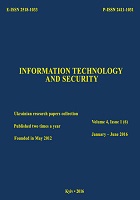Semantic interoperability as a basis of meaningful analytics
DOI:
https://doi.org/10.20535/2411-1031.2017.5.1.120565Keywords:
Semantic web, semantic interoperability, ontology, taxonomy, classification, intelligent search, predictive analytics, prescriptive analytics, meaningful analytics.Abstract
The main objective of the article is to show how ontologies, which are basic items of the semantic interoperability, can be used as a basis of meaningful analytics. It opens the way to solve a lot of problems like expert selection. The author discovers the pointed problem on the boarder between information technologies and recruitment problems like boolean search. The article contains a real example of boolean search query regarding information technologies such J2EE, JDBC, JAXB, JPA, Servlets, JAX-WS and others. The weekness of understanding of meaning some terms by a finder leads to incorrect results of the search. Only ontologies can handle synonyms and other kinds of relations between two terms – it is very important for avoiding of a confusion. Unfortunately, where is a misunderstanding of meaning following terms – classification, taxonomy, ontology. The existing articles do not solve the problem of unified understanding – it is an aspect of author’s investigation. The author shows how the analytical hierarchy process in the couple with ontologies can be used for empowering of existing approaches for solving the problem of expert selection. All conclusions are based on the detailed analysis of existing open publications. The pointed combination opens new horizons for predictive meaningful analytics.
References
“Advanced sourcing: smart searching with more relevant keywords”, Global recruiting roundtable, Aug. 2013. [Online]. Available: http://www.globalrecruitingroundtable.com/2013/ 08/31/advanced-sourcing-smart-searching-with-more-relevant-keywords-tip-4/. Accessed on: Marсh 25, 2017.
“What is semantic interoperability?”, IGI Global. [Online]. Available: http://www.igi-global.com/dictionary/semantic-interoperability/26340. Accessed on: Marсh 25, 2017.
“Compressus MEDxConnect. Top 5 Benefits of semantic interoperability”, May 2015. [Online]. Available at: http://compressus.com/blog/top-5-benefits-of-semantic-interoperability. Accessed on: Marсh 25, 2017.
Tom Gruber, “Ontology”, in Encyclopedia of Database Systems, Eds. New York, USA: Academic, 2009, pp. 1963-1965.
doi: 10.1007/978-0-387-39940-9_1318.
Reinout van Rees, “Clarity in the usage of the terms ontology, taxonomy and classification”. [Online]. Available: http://reinout.vanrees.org/_downloads/2003_cib.pdf. Accessed on: Marсh 25, 2017.
“What’s the difference between taxonomies and ontologies?”, New Idea Engineering, Dec. 2014. [Online]. Available: http://www.ideaeng.com/taxonomies-ontologies-0602. Accessed on: Marсh 25, 2017.
“Semantic Web: Linked Data on the Web”. [Online]. Available: https://www.w3.org/2007/ Talks/0130-sb-W3CTechSemWeb/#(24). Accessed on: Marсh 25, 2017.
J. Polloc, and R. Hodgson, Adaptive Information: Improving Business Through Semantic Interoperability, Grid Computing, and Enterprise Integration, Hoboken, NJ, USA: Wiley-Interscience, 2004.
H.A. Kravtsov, “Model of computations on classifications”, Electronic Modeling, vol. 38, no. 1, pp. 73-87, 2016.
“European Skills, Competences, Qualifications and Occupations”, ESCO. [Online]. Available: https://ec.europa.eu/esco/portal/home. Accessed on: Marсh 25, 2017.
“Predication and ontology: the categories”. [Online]. Available: https://faculty.washington.edu/ smcohen/320/cats320.htm. Accessed on: Marсh 25, 2017.
“WAND taxonomies”. [Online] Available: http://www.wandinc.com/taxonomies.aspx. Accessed on: Marсh 25, 2017.
“Encyclopedia of knowledge organization. Logical division”. [Online]. Available: http://www.isko.org/cyclo/logical_division. Accessed on: Marсh 25, 2017.
“The 2012 ACM Computing Classification System”, Association for computing machinery. [Online]. Available: https://www.acm.org/publications/class-2012. Accessed on: Marсh 25, 2017.
“New Korn Ferry Leadership Architect Global Competency Framework”, Korn Ferry. [Online]. Available: http://www.kornferry.com/products/korn-ferry-leadership-architect/kfla-overview. Accessed on: Marсh 25, 2017.
“The International Classification of Disease”, World Health Organization. [Online]. Available: http://www.who.int/classifications/icd/en/. Accessed on: Marсh 25, 2017.
H. Kravtsov, “AI and predictive analytics in workforce development (WD) are trends in the future”, 2017. [Online]. Available: https://www.linkedin.com/pulse/ai-predictive-analytics-workforce-development-wd-kravtsov-ph-d. Accessed on: Marсh 25, 2017.
Downloads
Published
How to Cite
Issue
Section
License
Copyright (c) 2020 Collection "Information technology and security"

This work is licensed under a Creative Commons Attribution 4.0 International License.
The authors that are published in this collection, agree to the following terms:
- The authors reserve the right to authorship of their work and pass the collection right of first publication this work is licensed under the Creative Commons Attribution License, which allows others to freely distribute the published work with the obligatory reference to the authors of the original work and the first publication of the work in this collection.
- The authors have the right to conclude an agreement on exclusive distribution of the work in the form in which it was published this anthology (for example, to place the work in a digital repository institution or to publish in the structure of the monograph), provided that references to the first publication of the work in this collection.
- Policy of the journal allows and encourages the placement of authors on the Internet (for example, in storage facilities or on personal web sites) the manuscript of the work, prior to the submission of the manuscript to the editor, and during its editorial processing, as it contributes to productive scientific discussion and positive effect on the efficiency and dynamics of citations of published work (see The Effect of Open Access).

